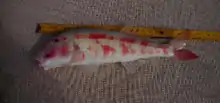Pseudupeneus prayensis
Pseudupeneus prayensis, the West African goatfish, is a species of goatfish, a marine ray-finned fish from the family Mullidae.[2] This fish grows to 55 cm maximal length. The species name "prayensis" refers to the city Praia, the capital of Cape Verde, the species was described with a type locality of "Port Praya, Cape Verde Islands".[3]
| Pseudupeneus prayensis | |
|---|---|
 | |
| Scientific classification | |
| Kingdom: | Animalia |
| Phylum: | Chordata |
| Class: | Actinopterygii |
| Order: | Perciformes |
| Family: | Mullidae |
| Genus: | Pseudupeneus |
| Species: | P. prayensis |
| Binomial name | |
| Pseudupeneus prayensis (Cuvier, 1829) | |
| Synonyms | |
|
Upeneus prayensis Cuvier, 1829 | |
Description
Pseudupenus prayensis has a moderately compressed body with a head profile which is not markedly convex. It has a single spine on the rear margin of the gill cover and a pair of thick barbels below its chin. Both jaws are equipped with strong, conical teeth with a few of the outer teeth in the upper jaw being backward pointing and theser are obvious when the mouth is closed. There are no teeth on vomer and palatines. There are 8 spines in the first dorsal fin with the first spine being very short, the second dorsal fin has a single spine and eight soft rays. The body is covered in large scales with a count of 28–29 in the lateral line. It is normally a rosy colour marked with three or four horizontal red lines along its body. The largest fishes may have a standard length of 55 centimetres (22 in) but they are more normally 30–35 cm (12–14 in).[4]
Distribution
Pseudupenus prayensis occurs in the eastern Atlantic Ocean, off the coast of Africa between southern Morocco and Angola, including the Cape Verde Islands and also in the Mediterranean Sea.[5]
Habitat and biology
Pseudupenus prayensis occurs mostly over muddy or sandy sea beds where it feeds on benthic invertebrates. It may also be found over rocky reefs to depths of 300 metres (980 ft). It is common in estuaries.[1]
Usage
Pseudupeneus prayensis is an important species for commercial fisheries along the West African coast. They are mainly taken using trawls, although they are also taken using trammel nets and entangling nets. This species is among the most quarry species for coastal demersal fisheries in Ghana while in Senegal it is an important demersal resource and is caught by both industrial and artisanal fishing fleets.[1]
References
- Camara, K.; Carpenter, K.E.; Djiman, R.; et al. (2015). "Pseudupeneus prayensis". IUCN Red List of Threatened Species. 2015: e.T18177478A42691864. doi:10.2305/IUCN.UK.2015-4.RLTS.T18177478A42691864.en. Retrieved 6 April 2020.
- Pseudupeneus prayensis (Cuvier, 1829). Retrieved through: World Register of Marine Species on 14 January 2019.
- Eschmeyer, William N.; Fricke, Ron & van der Laan, Richard (eds.). "Pseudupeneus prayensis". Catalog of Fishes. California Academy of Sciences. Retrieved 6 April 2020.
- J.C. Hureau. "Goatfish (Pseudupeneus prayensis)". Fishes of the NE Atlantic and Mediterraean. Marine Species Identification Portal. Retrieved 6 April 2020.
- Froese, Rainer and Pauly, Daniel, eds. (2019). "Pseudupeneus prayensis" in FishBase. December 2019 version.
Further reading
- Fenner, Robert M. The Conscientious Marine Aquarist. Neptune City, New Jersey, USA: T.F.H. Publications, 2001.
- Helfman, G., B. Collette and D. Facey: The diversity of fishes. Blackwell Science, Malden, Massachusetts, USA, 1997.
- Hoese, D.F. 1986. A M.M. Smith and P.C. Heemstra (eds.) Smiths' sea fishes. Springer-Verlag, Berlin, Germany
- Maugé, L.A. 1986. A J. Daget, J.-P. Gosse and D.F.E. Thys van den Audenaerde (eds.) Check-list of the freshwater fishes of Africa (CLOFFA). ISNB, Brussels; MRAC, Tervuren, Flanders; and ORSTOM, Paris, France, Vol. 2.
- Moyle, P. and J. Cech.: Fishes: An Introduction to Ichthyology, 4th ed., Upper Saddle River, New Jersey, USA: Prentice-Hall. 2000.
- Nelson, J.: Fishes of the World, 3rd ed.. New York, USA: John Wiley and Sons., 1994
- Wheeler, A.: The World Encyclopedia of Fishes, 2nd ed., London: Macdonald., 1985
External links
- Photos of Pseudupeneus prayensis at FishBase
